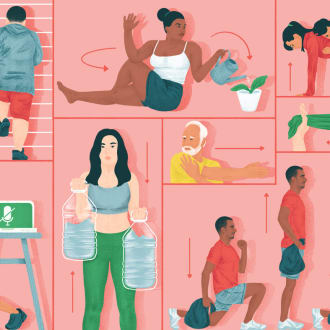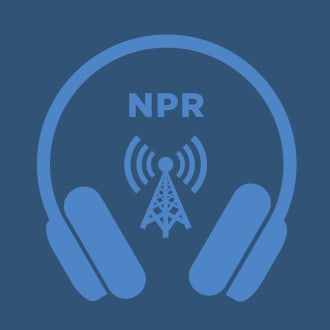The Best of NPR
20+ most popular NPR articles, as voted by our community.
Trending
These are currently making the rounds on Refind.
The case for financial literacy education
Financial literacy programs have been called useless in the past. But a new study suggests that's due to the way the subject is taught, rather than the subject itself.
The work and legacy of photographer Anja Niedringhaus endure 10 years after her death
A new exhibition and book honor the memory of the Pulitzer Prize-winning German photojournalist who was killed on April 4, 2014, while on assignment for The Associated Press in Afghanistan.
Places across the U.S. are testing no-strings cash as part of the social safety net
The idea got a boost from the pandemic, when an array of cash relief helped cut child poverty and keep people housed. Researchers are studying how much money, for how long, may have lasting impact.
My daughters sold Girl Scout Cookies. Here's what I learned in the Thin Mint trenches
There are no Wonka-like scenes of Tagalong rainbows and Do-si-do stools. But parents can be forgiven for feeling like Oompa Loompas — hardworking cogs in a well-oiled machine.
U.S. drops in new global happiness ranking. One age group bucks the trend
A new happiness report finds sharp declines in well-being among adolescents and young adults in the U.S. But the picture is better for people aged 60 and older, marking a striking generational divide.
NPR on Anger
How To Control (And Even Use) Your Anger — With Meditation
Anger can be a powerful teacher — if we know how to use it. In this episode, Lama Rod Owens, a teacher of Tibetan Buddhism, explains how he learned to love his anger, and gives listeners a six-step…
«Anger is a complicated emotion that many of us try to suppress rather than examine — a desire often reinforced by societal narratives that dictate who is allowed to hold and process the sentiment.»
Got Anger? Try Naming It To Tame It
While many people believe that how we feel and express anger is hard-wired, some scientists suggest our experience and culture help shape it. One way to get a handle on it may be to personalize it.
NPR on Climate Crisis
The world’s melting ice has surprising impacts. Can you guess them?
Melting glaciers and ice caps are far from where most people live. But the impacts stretch across the planet. See if you can guess how.
A new kind of climate refugee is emerging
They flee their homes not solely because of climatic changes that make it difficult to earn a living but also because of violence sparked by the competition for dwindling resources.
NPR on Conspiracy Theories
She was a popular yoga guru. Then she embraced QAnon conspiracy theories
Themes like everything is connected, nothing happens without a purpose, and nothing is what it seems are central to both yoga philosophy and conspiratorial thinking.
How Damar Hamlin's collapse fueled anti-vaccine conspiracy theories
In the absence of information about why the Buffalo Bills player collapsed during a game, misleading claims about COVID vaccines quickly spread online.
NPR on Dating
The dating app paradox: Why dating apps may be worse than ever
Investors in dating app companies are suffering from heartbreak. As these companies shift gears and try to make a profit, many of their users are heartbroken too.
Take your date to the grocery store
Cancel your dinner reservations and grab a cart. You'll get to know your date better wandering through a supermarket. Because what could be more wonderful than regular love?
NPR on Facebook
People are talking about Web3. Is it the Internet of the future or just a buzzword?
In the Web3 vision of the internet's future, tech giants like Facebook and Google aren't as critical. The internet instead is a peer-to-peer experience built on what's known as the blockchain.
«"It's a promised future internet that fixes all the things people don't like about the current internet, even when it's contradictory."»
Are Conspiracy Theories Good For Facebook?
Viral conspiracy theories are dangerous, and maybe profitable.
NPR on Health
There's a way to get healthier without even going to a gym. It's called NEAT
All those daily activities we'd rather avoid — taking the stairs, cleaning the house etc. — have a big metabolic payoff. Non-exercise activity thermogenesis can help manage weight and boost health.
4 exercises that can prevent (and relieve!) pain from computer slouching and more
Vinh Pham, physical therapist and author of "Sit Up Straight: Futureproof Your Body Against Chronic Pain with 12 Simple Movements," explains why mobility exercises and good posture may be your best…
NPR on Mental Health
Sitting too much drags down your mental health. Here's how to get moving
A lot of us have been sitting too much, and it's hard on us mentally as well as physically. Research shows breaking up that couch or desk time with short stints of movement can help lift your mood.
«Don't blame yourself if you're struggling to get started.»
Changing Your Diet Can Help Tamp Down Depression, Boost Mood
Depression symptoms dropped significantly in a group of young adults who ate a Mediterranean-style diet for three weeks. It's the latest study to show that food can influence mental health.
NPR on Myths
Just Move: Scientist Author Debunks Myths About Exercise And Sleep
Paleoanthropologist Daniel Lieberman says the concept of "getting exercise" is relatively new. His new book, Exercised, examines why we run, lift and walk for a workout, when our ancestors didn't.
Popular myths about sleep, debunked : Life Kit
Is it OK to exercise before you hit the hay? Sleep for less than 5 hours a night? Sleep scientist Rebecca Robbins sets the record straight to help you get better sleep.
NPR on Parenting
Yes, I'm a Disney Adult. Let me explain
Backlash against Disney Adults reveals a lot about the ever-morphing hierarchies of fandom within the cultural zeitgeist, and what's considered cool to obsess over and what's not.
How Inuit Parents Teach Kids To Control Their Anger
At the top of the world, the Inuit culture has developed a sophisticated way to sculpt kids' behavior without yelling or scolding. Could discipline actually be playful?
NPR on Religion
8 listeners share the powerful ways they keep in touch with their ancestors
Last month, we asked our audience to tell us how they stay connected to their late loved ones. They tell us about the objects they keep, the altars they built and how they pay their respects.
Non-religious Americans seek community
A new study shows nearly one-third of Americans have no religious affiliation. Some secular organizations are trying to create the community of church — without the religion.
Popular
These are some all-time favorites with Refind users.
Here's why you should make a habit of having more fun
Happiness can sometimes feel just out of reach. But having more fun? You've got this — and those giggles and playful moments can make a big difference to your health and well-being.
Daily 'breath training' can work as well as medicine to reduce high blood pressure
Research finds five to 10 minutes daily of a type of strength training for muscles used in breathing can help anyone reduce or prevent high blood pressure. The training can also help elite athletes.
Gen Z is driving sales of romance books to the top of bestseller lists
For months, Colleen Hoover and Emily Henry have occupied multiple spots on the New York Times paperback trade fiction bestsellers list. The success of these romance writers has been aided by Gen Z.
What is 'quiet quitting,' and how it may be a misnomer for setting boundaries at work
Quiet quitting is taking over TikTok as a new workplace trend popular with Gen Z. However, it may be a misnomer for setting healthy boundaries in the workplace.
«The term 'quiet quitting' is so offensive, because it suggests that people that do their work have somehow quit their job, framing workers as some sort of villain in an equation where they're doing exactly what they were told,»
The cheating scandal roiling the chess world has a new wrinkle
World champion Magnus Carlsen abruptly resigned after making a single move in his highly anticipated rematch with Hans Niemann. Calls have increased for an investigation.
What is Refind?
Every day Refind picks the most relevant links from around the web for you. is one of more than 10k sources we monitor.
How does Refind curate?
It’s a mix of human and algorithmic curation, following a number of steps:
- We monitor 10k+ sources and 1k+ thought leaders on hundreds of topics—publications, blogs, news sites, newsletters, Substack, Medium, Twitter, etc.
- In addition, our users save links from around the web using our Save buttons and our extensions.
- Our algorithm processes 100k+ new links every day and uses external signals to find the most relevant ones, focusing on timeless pieces.
- Our community of active users gets the most relevant links every day, tailored to their interests. They provide feedback via implicit and explicit signals: open, read, listen, share, mark as read, read later, «More/less like this», etc.
- Our algorithm uses these internal signals to refine the selection.
- In addition, we have expert curators who manually curate niche topics.
The result: lists of the best and most useful articles on hundreds of topics.
How does Refind detect «timeless» pieces?
We focus on pieces with long shelf-lives—not news. We determine «timelessness» via a number of metrics, for example, the consumption pattern of links over time.
How many sources does Refind monitor?
We monitor 10k+ content sources on hundreds of topics—publications, blogs, news sites, newsletters, Substack, Medium, Twitter, etc.
Can I submit a link?
Indirectly, by using Refind and saving links from outside (e.g., via our extensions).
How can I report a problem?
When you’re logged-in, you can flag any link via the «More» (...) menu. You can also report problems via email to hello@refind.com
Who uses Refind?
450k+ smart people start their day with Refind. To learn something new. To get inspired. To move forward. Our apps have a 4.9/5 rating.
Is Refind free?
Yes, it’s free!
How can I sign up?
Head over to our homepage and sign up by email or with your Twitter or Google account.





























